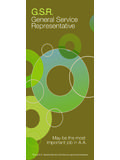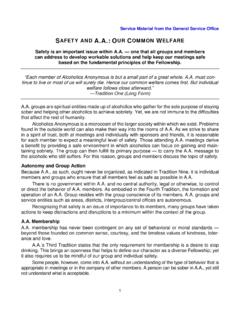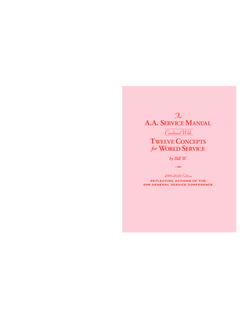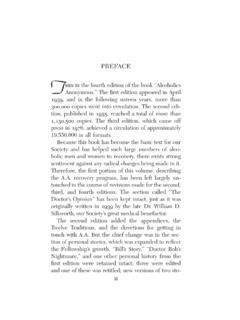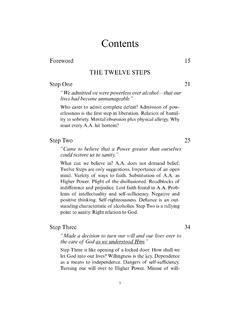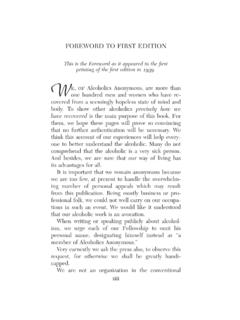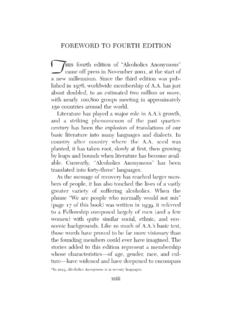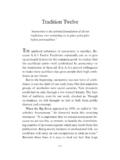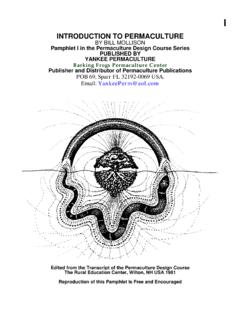Transcription of P-1 - This is A.A. - An introduction to the A.A. Recovery ...
1 A DECLARATION OF UNITYThis we owe to s future: To place our common welfare first; to keep our fellowship united. For on unity depend our lives and the lives of those to am anyone, anywhere, reaches outfor help, I want the hand of alwaysto be there. And for that: I am is introduction to the Recovery ProgramThis is General Service Conference-approved Anonymous is a fellowship of men and women who share their experience, strength and hope with each other that they may solve their common problem and help others to recov-er from alcoholism. The only requirement for membership is a desire to stop drinking.
2 There are no dues or fees for membership; we are self-supporting through our own contributions. is not allied with any sect, denomination, politics, organization or institution; does not wish to engage in any controversy; neither endorses nor opposes any causes. Our primary purpose is to stay sober and help other alcoholics to achieve by Grapevine, Inc.;reprinted with permissionCopyright 2017by Alcoholics Anonymous World Services, printing 1984 All rights reservedMail address: Box 459 Grand Central StationNew York, NY 07/17 (RIPON)This Is introduction to Recovery programOnly you can decideIf you seem to be having trouble with your drink-ing, or if your drinking has reached the point where it worries you a bit, you may be inter-ested in knowing something about Alcoholics Anonymous and the program of Recovery from alcoholism.
3 After reading this brief outline, you may decide that has nothing to offer you. Should this be the case, we suggest only that you keep an open mind on the subject. Consider your drinking carefully in the light of what you may learn from these pages. Determine, for your-self, whether or not alcohol has truly become a problem for you. And remember that you will always be most welcome to join the thousands of men and women in who have put their drink-ing problems behind them and now lead normal lives of constructive, day-by-day we areWe in are men and women who have discov-ered, and admitted, that we cannot control alco-hol.
4 We have learned that we must live without it if we are to avoid disaster for ourselves and those close to local groups in thousands of commu-nities, we are part of an informal international fellowship, which now has members in more than 180 countries. We have but one primary purpose: to stay sober ourselves and to help others who may turn to us for help in achieving are not reformers, and we are not allied with any group, cause, or religious denomination. We have no wish to dry up the world. We do not recruit new members, but do welcome them. We do not impose our experience with problem drinking on others, but we do share it when we are asked to do our membership may be found men and women of all ages and many different social, economic, and cultural backgrounds.
5 Some of us drank for many years before coming to the reali-zation we could not handle alcohol. Others were fortunate enough to appreciate, early in life or in their drinking careers, that alcohol had become consequences of our alcoholic drinking have also varied. A few of us had become dere-licts before turning to for help. Some had lost family, possessions, and self-respect. We had been on skid row in many cities. Some of us had been hospitalized or jailed times without number. We had committed grave offenses against soci-ety, our families, our employers, and among us have never been jailed or hospitalized.
6 Nor had we lost jobs or families through drinking. But we finally came to a point 7where we realized that alcohol was interfering with normal living. When we discovered that we could not live without alcohol, we, too, sought help through the great faiths are represented in our Fellowship, and many religious leaders have encouraged our growth. There are also atheists and agnostics among us. Belief in, or adherence to, a formal creed is not a condition of are united by our common problem, alco-hol. Meeting and talking and helping other alco-holics together, we are somehow able to stay sober and to lose the compulsion to drink, once a dominant force in our do not think we are the only people who have the answer to problem drinking.
7 We know that the program works for us, and we have seen it work for every newcomer, almost without exception, who honestly and sincerely wanted to quit , we have learned a number of things about alcoholism and about ourselves. We try to keep these facts fresh in our thinking at all times, because they seem to be the key to our sobriety. For us, sobriety must always come we have learned about alcoholismThe first thing we have learned about alcohol-ism is that it is one of the oldest problems in history. Only recently have we begun to benefit from new approaches to the problem. Doctors today, for example, know a great deal more about alcoholism than their predecessors did only two generations ago.
8 They are beginning to define the problem and study it in there is no formal definition of alcoholism, most of us agree that, for us, it could be described as a physical compulsion, coupled with a mental obsession. We mean that we had a distinct physical desire to consume alcohol beyond our capacity to control it, and in defiance of all rules of common sense. We not only had an abnormal craving for alcohol, but we frequently 8yielded to it at the worst possible times. We did not know when (or how) to stop drinking. Often, we did not seem to have sense enough to know when not to alcoholics, we have learned the hard way that willpower alone, however strong in other respects, was not enough to keep us sober.
9 We have tried laying off for specified periods. We have taken solemn pledges. We have switched brands and beverages. We have tried drinking only during certain hours. But none of our plans worked. We always wound up, sooner or later, by getting drunk when we not only wanted to stay sober, but had every rational incentive for staying have gone through stages of dark despair when we were sure that there was something wrong with us mentally. We came to hate our-selves for wasting the talents with which we had been endowed and for the trouble we were causing our families and others.
10 Frequently, we indulged in self-pity and proclaimed that nothing could ever help can smile at those recollections now, but at the time they were grim, unpleasant an illnessToday we are willing to accept the idea that, as far as we are concerned, alcoholism is an illness, a progressive illness which can never be cured, but which, like some other illnesses, can be arrested. We agree that there is nothing shame-ful about having an illness, provided we face the problem honestly and try to do something about it. We are perfectly willing to admit that we are allergic to alcohol and that it is simply common sense to stay away from the source of our understand now that once a person has crossed the invisible borderline from heavy drink-ing to compulsive alcoholic drinking, that person will always remain an alcoholic.
